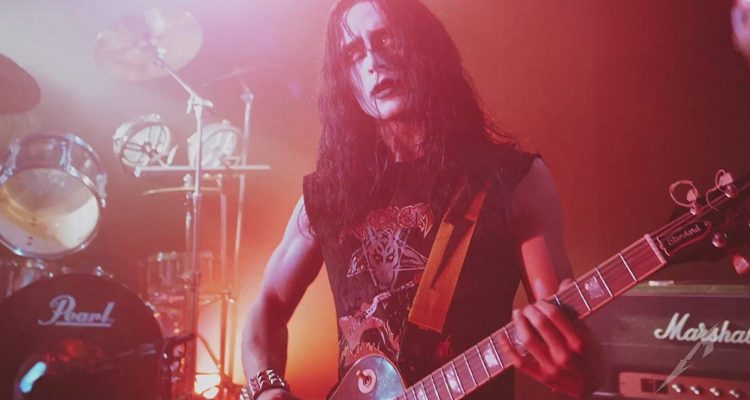Authenticity is the greatest cultural currency a musician can carry, and when combined with a powerful image, the result can be explosive. As Malcolm McLaren showed the world with the Sex Pistols, both authenticity and image can be carefully managed and manufactured. And as the Sex Pistols proved, they could take the ideas presented by McLaren, run with them into unexpected places, and develop an audience and following that take them further still. How much of the burgeoning Norwegian black metal scene in the 1990s was authentic or manufactured depends on who you ask, but as it’s presented in “Lords Of Chaos,” what started as a harmless group of young men wearing black, talking about Satan, and pushing the extreme musical edges of the genre soon led to suicide, arson, and murder. It got very real.
As Øystein Aarseth aka Euronymous (Rory Culkin) makes clear in his “Goodfellas”-style voiceover, “This is my story and it will end badly.” However, it begins innocently enough with the young man assembling a band of outcasts to form Mayhem, who have their earliest practices in the basement of the pleasantly middle-class home where Euronymous lives with his parents and sister. The group eventually decamps to a home in the countryside to focus on their music, and recruit the morbidly strange and deeply depressed Per Yngve Ohlin aka Dead (Jack Kilmer) to sing. The group starts playing shows, and establishing their confrontational ethos, when tragedy strikes — Dead commits suicide. Where most would grieve the loss, Euronymous sees opportunity, snapping photographs of the gruesome death tableau for an album cover, and turning bits of Dead’s skull bones into jewelry. The next step in Euronymous’ black metal dream comes when he opens the record shop Helvete (“Hell”), a place where like-minded freaks can gather. Those deemed worthy enough are invited to join The Black Circle, a social club in the basement of the store where Euronymous and his associates can share their darkest ideas and secrets.
This hell on Earth sounds like heaven to Kristian Vikernes aka Varg (Emory Cohen), who longs to earn the attention of Euronymous. When Varg impresses Euronymous with his solo demo tape performing as Burzum, the impresario not only takes him under his wing, but invites him to sing for Mayhem. But it’s not long until Varg starts taking Euronymous’ talk of smashing Christian society and the comforts of democracy, and putting it to action. Even more, he inspires others to follows his footsteps, leading to church burnings and murder. Euronymous can only sit by and watch The Black Circle spin out of control, all while he tries to manipulate each shocking turn of events into a marketing opportunity. Euronymous may have established the rules that separate poseurs from true black metalheads, but Varg redraws the lines, leading to a tragic conflict between these leading figures of the scene.
Based on a true story, that’s even more strange and lurid than any of the above sounds, director Jonas Åkerlund’s approach is disappointingly distant and bemused. “Lords Of Chaos” fatally finds the filmmaker judging the characters from the very first frame, treating them as dweebs in dress-up, who simply took things too far. There is a streak of comedy throughout that undercuts the severity of their metalheads’ crimes, and how much the scene and ideology meant to those who participated in it. Given that Åkerlund himself (aka Vans McBurger) was briefly the drummer of Swedish black metal act Bathory, this seeming dismissiveness of the entire scene is even more odd. It’s almost as if Åkerlund himself is embarrassed at having even been adjacent to what was happening at the time. He’s certainly not interested in investigating the story beyond the very broad facts, and sidesteps the strong undercurrent of sexism and racism the scene fostered (Varg has since publicly identified with a belief system that marries Paganism and Nazism, spouting both racist and anti-Semitic views).
Perhaps to add some kind of gravity, the director is unflinching when it comes to the murder sequences, but he lingers on them for so long, they feel like exploitative excerpts from the bloody B-movies that Euronymous and his friends watch on a loop at Helvete. An attempt at third act drama, complete with anachronistic Sigur Ros songs cued up on the soundtrack to wring some emotion, also fails completely. Åkerlund’s contempt for everyone involved by this point is so well-established, that the turn toward any kind of understanding or insight doesn’t resonate. It’s a shame given that both Culkin and Cohen turn in better performances than otherwise missed opportunity of “Lords Of Chaos” deserves. The pair plays well off each other, and Cohen, in particular, is excellent at tapping into the conflicting emotions at Varg’s troubling core.
As Akerlund sees it, Euronymous was nothing more than a pseudo-McLaren, with Varg as his Johnny Rotten. It’s not only a reductive assessment, but one that diminishes the genuine impact and lasting influence they both made, as infamous and complex as it might be. “Lords Of Chaos” is more interested in the spectacle than the substance behind the true story, and that kind of phoniness likely wouldn’t even get the film or Åkerlund invited into The Black Circle. [D]

